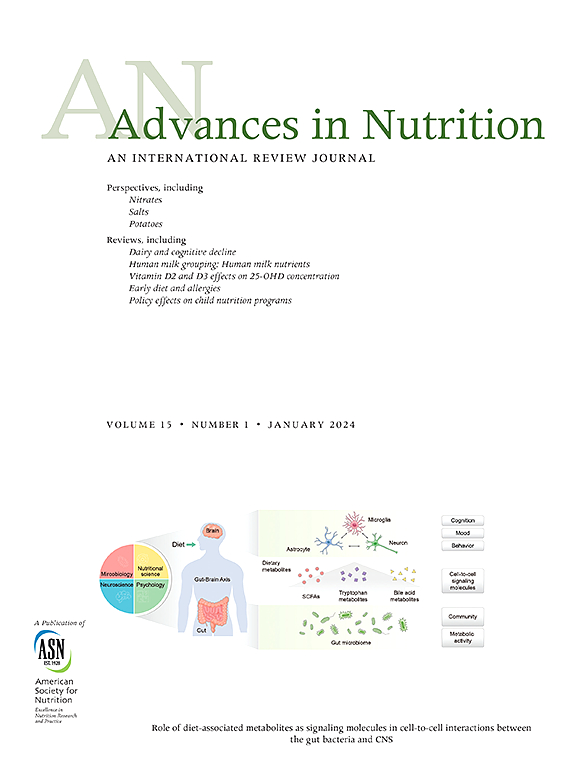海鲜与儿童神经认知发展:系统综述。
IF 9.2
1区 医学
Q1 NUTRITION & DIETETICS
引用次数: 0
摘要
背景:海产品是支持儿童和青少年神经认知发育的必需营养素来源,但也存在对污染物暴露的担忧。评估海产品作为一种食物,而不是营养素或污染物的来源,可以为未来的饮食指导提供信息。目的:更新和评估儿童和青少年海鲜消费与神经认知发展之间的关系。方法:检索截至2024年9月的3个电子数据库,更新2000-2019年的检索结果。如果评估儿童和青少年时期海鲜与神经认知发展结果(认知发展、行为、运动/身体发展、语言/沟通发展、抑郁、焦虑、多动症和自闭症谱系障碍)之间的关联,则纳入文章。所有的文章都由两位独立的分析人员在标题、摘要和全文层面进行筛选。数据提取,质量检查由第二分析师,并由两名分析师独立地综合叙述,考虑方向,大小和统计意义的结果,为每个结果;分歧通过讨论得到解决。偏倚风险采用ROBINS-E和rob2.0进行评估。用GRADE评价证据的确定性。结果:纳入了北欧进行的5项短期(12-16周)随机对照试验(rct)和各国进行的9项前瞻性队列研究(PCSs)的18篇文章。证据表明,在0-18岁的儿童和青少年中,较高的海鲜消费与改善认知发展结果之间存在关系(GRADE: low)。这一结论是通过5项短期随机对照试验得出的,在这些试验中,10个月至15岁的儿童分别被提供了富含脂肪的鱼、肉、家禽或鱼油补充剂。这些随机对照试验在很大程度上得到了5个长期PCS结果的支持。行为结果的证据不一致,其他结果的证据缺乏。结论:在目前推荐的摄入量范围内食用海鲜,主要是富含脂肪的鱼,可能会改善儿童和青少年的认知发展结果。系统评价或荟萃分析的注册表和注册号:prospero: crd42023432844。意义说明:在目前推荐的摄入量范围内食用海鲜,主要是富含脂肪的鱼类,可能会改善儿童和青少年的认知发展结果。在美国,包括儿童和青少年在内的所有人的海鲜摄入量都低于目前的建议,因此增加摄入量可能有助于更好的发育结果。本文章由计算机程序翻译,如有差异,请以英文原文为准。
Seafood and Neurocognitive Development in Children: A Systematic Review
Seafood is a source of essential nutrients to support neurocognitive development of children and adolescents, but there are concerns about contaminant exposure. Assessing seafood as a food group, rather than a source of nutrients or contaminants, can inform future dietary guidance. This study aimed to update and assess relationships between seafood consumption during childhood and adolescence and neurocognitive development. Three electronic databases were searched until September 2024 to update a previous search from 2000 to 2019. Articles were included if associations were assessed between seafood intake during childhood and adolescence and neurocognitive development outcomes (cognitive development, social-emotional and behavioral development, movement/physical development, language/communication development, depression, anxiety, attention-deficit/hyperactivity disorder, and autism spectrum disorder). All articles were screened at title, abstract, and full-text levels by 2 independent analysts. Data were extracted by 1 analyst, quality checked by a second analyst, and synthesized narratively by 2 analysts independently, considering direction, magnitude, and statistical significance of results for each outcome; discrepancies were resolved via discussion. Risk of bias was assessed using ROBINS-E and ROB 2.0. Certainty of evidence was assessed with Grading of Recommendations Assessment, Development and Evaluation (GRADE). Eighteen articles from 5 short-term (12–16 wk) RCTs conducted in Northern Europe and 9 prospective cohort studies conducted in various countries were included. The evidence suggested a relationship between higher seafood consumption and improved cognitive development outcomes for children and adolescents aged 0–18 y old (GRADE: low). This conclusion was informed by 5 short-term RCTs in which children aged 10 mo to 15 y were provided fatty fish compared with meat, poultry, or fish oil supplements. These RCTs were largely supported by results from 5 longer-term prospective cohort studies. Evidence was inconsistent for social-emotional and behavioral development outcomes and was lacking for other outcomes. Seafood consumption within current recommended intake amounts consumed mainly as fatty fish likely improves cognitive development outcomes in children and adolescents.
This review was registered at PROSPERO as CRD42023432844.
求助全文
通过发布文献求助,成功后即可免费获取论文全文。
去求助
来源期刊

Advances in Nutrition
医学-营养学
CiteScore
17.40
自引率
2.20%
发文量
117
审稿时长
56 days
期刊介绍:
Advances in Nutrition (AN/Adv Nutr) publishes focused reviews on pivotal findings and recent research across all domains relevant to nutritional scientists and biomedical researchers. This encompasses nutrition-related research spanning biochemical, molecular, and genetic studies using experimental animal models, domestic animals, and human subjects. The journal also emphasizes clinical nutrition, epidemiology and public health, and nutrition education. Review articles concentrate on recent progress rather than broad historical developments.
In addition to review articles, AN includes Perspectives, Letters to the Editor, and supplements. Supplement proposals require pre-approval by the editor before submission. The journal features reports and position papers from the American Society for Nutrition, summaries of major government and foundation reports, and Nutrient Information briefs providing crucial details about dietary requirements, food sources, deficiencies, and other essential nutrient information. All submissions with scientific content undergo peer review by the Editors or their designees prior to acceptance for publication.
 求助内容:
求助内容: 应助结果提醒方式:
应助结果提醒方式:


